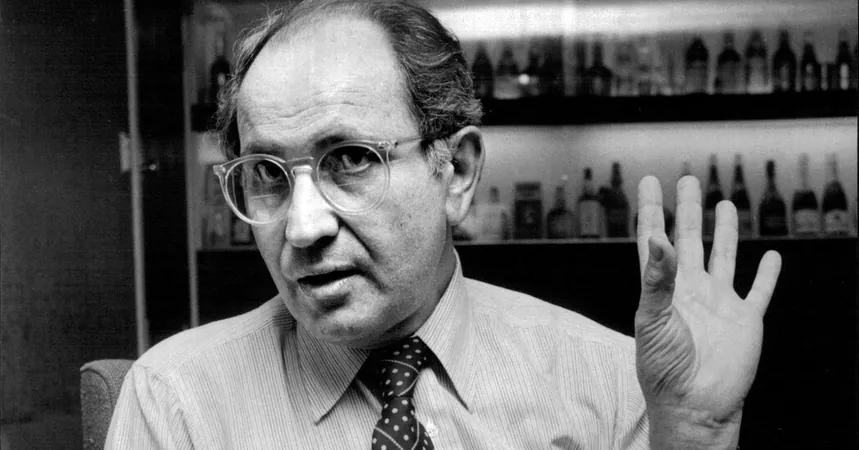
Peter Sichel: The Wine Merchant with a Remarkable Past Passes Away at 102
2025-03-04
Author: Wai
Peter Sichel, a figure whose life resembled a gripping spy novel, passed away on February 24 at his home in Manhattan. He was 102 years old. Best known for transforming Blue Nun into a global sensation in the wine industry during the 1970s and '80s, Sichel's life was much more than just about fine wines. At the height of its popularity in 1985, Blue Nun sold an astonishing 30 million bottles of its sweet German white wine, marked by its enchanting label featuring nuns harvesting grapes.
Sichel’s journey into the world of wine began in earnest after he took the helm of his family's wine business in 1960. However, before embarking on that path, he led an extraordinary life as a refugee, soldier, and spy. Following his emigration to the United States as a teenager, Sichel volunteered for the U.S. Army immediately after the attack on Pearl Harbor. His strong intelligence skills caught the attention of the Office of Strategic Services (OSS), America's first intelligence agency, which recruited him during World War II.
As an OSS operative, he served valiantly in Algiers and was later embedded with General George S. Patton’s Third Army, during which he conducted important espionage efforts and interrogated enemy soldiers. Remarkably, at just 23 years old, Sichel became the OSS station chief in Berlin, gaining the reputation of a prodigy as he analyzed vital intelligence that would shape the post-war landscape.
Sichel played a pivotal role in uncovering Soviet strategies during the Cold War, particularly regarding the fate of divided Germany. His foresight dispelled myths of an imminent Soviet invasion of western Germany, a conclusion that contradicted widespread fears at the time. This discernment was crucial during the 1948 Berlin Blockade—a tense episode relieved only by the Berlin Airlift, where thousands of supplies were flown into the city.
Later, he was appointed station chief in Hong Kong, focusing on the growing communist threat in Asia. His experiences there and in Eastern Europe unearthed troubling conflicts within the CIA, particularly regarding the agency's covert operations. Sichel expressed dismay over the misalignment between intelligence and action, famously stating that critical information was often disregarded in favor of aggressive, and sometimes illegal, covert projects.
Despite the highs of his espionage career, Sichel's thirst for transparency led him to resign from the CIA in 1959, disillusioned by their practices. His eye-opening insights into the agency's flawed operations were immortalized in his memoir, "The Secrets of My Life: Vintner, Prisoner, Soldier, Spy" and highlighted in the documentary "The Last Spy," set for release soon.
Sichel’s journey to becoming a successful wine merchant included significant hurdles. After narrowly escaping the Nazi regime, his family fled to France and then managed to emigrate to America in 1941. Upon taking over the family wine business, he revamped it, merging it with established enterprises to enhance its international reach. While Blue Nun defined his legacy, Sichel also sought to promote new brands that did not achieve similar acclaim.
As the wine landscape evolved in the 1990s, Sichel sold off the American branch of the family business, transitioning from mass-market wines to a focus on quality. He also invested in Château Fourcas Hosten, turning its fortunes around by improving production methods before selling the winery in 2006.
Sichel leaves behind a rich legacy not just as a wine merchant but as a man who witnessed and influenced pivotal moments in history. He is survived by his daughters, Bettina and Sylvia, and multiple grandchildren. His life’s remarkable narrative reminds us of the profound impact one individual can have across diverse realms—intelligence, business, and beyond.




 Brasil (PT)
Brasil (PT)
 Canada (EN)
Canada (EN)
 Chile (ES)
Chile (ES)
 Česko (CS)
Česko (CS)
 대한민국 (KO)
대한민국 (KO)
 España (ES)
España (ES)
 France (FR)
France (FR)
 Hong Kong (EN)
Hong Kong (EN)
 Italia (IT)
Italia (IT)
 日本 (JA)
日本 (JA)
 Magyarország (HU)
Magyarország (HU)
 Norge (NO)
Norge (NO)
 Polska (PL)
Polska (PL)
 Schweiz (DE)
Schweiz (DE)
 Singapore (EN)
Singapore (EN)
 Sverige (SV)
Sverige (SV)
 Suomi (FI)
Suomi (FI)
 Türkiye (TR)
Türkiye (TR)
 الإمارات العربية المتحدة (AR)
الإمارات العربية المتحدة (AR)